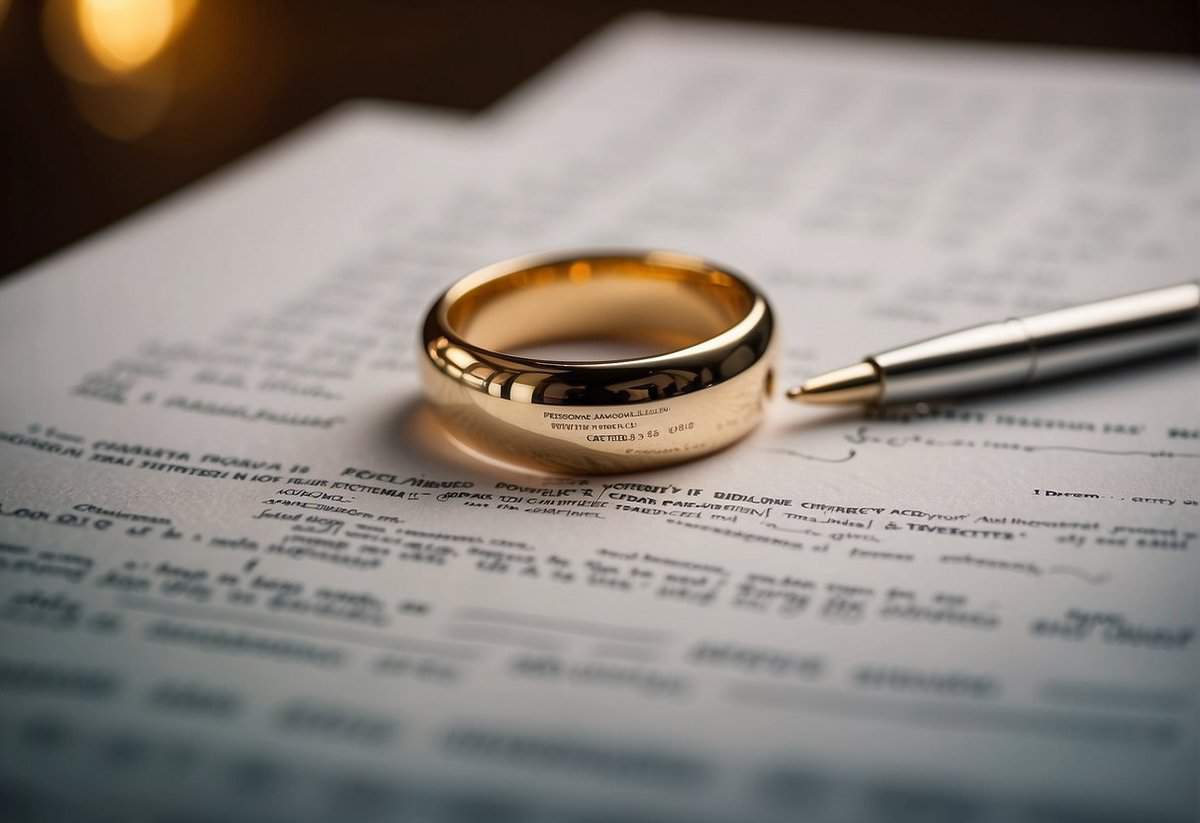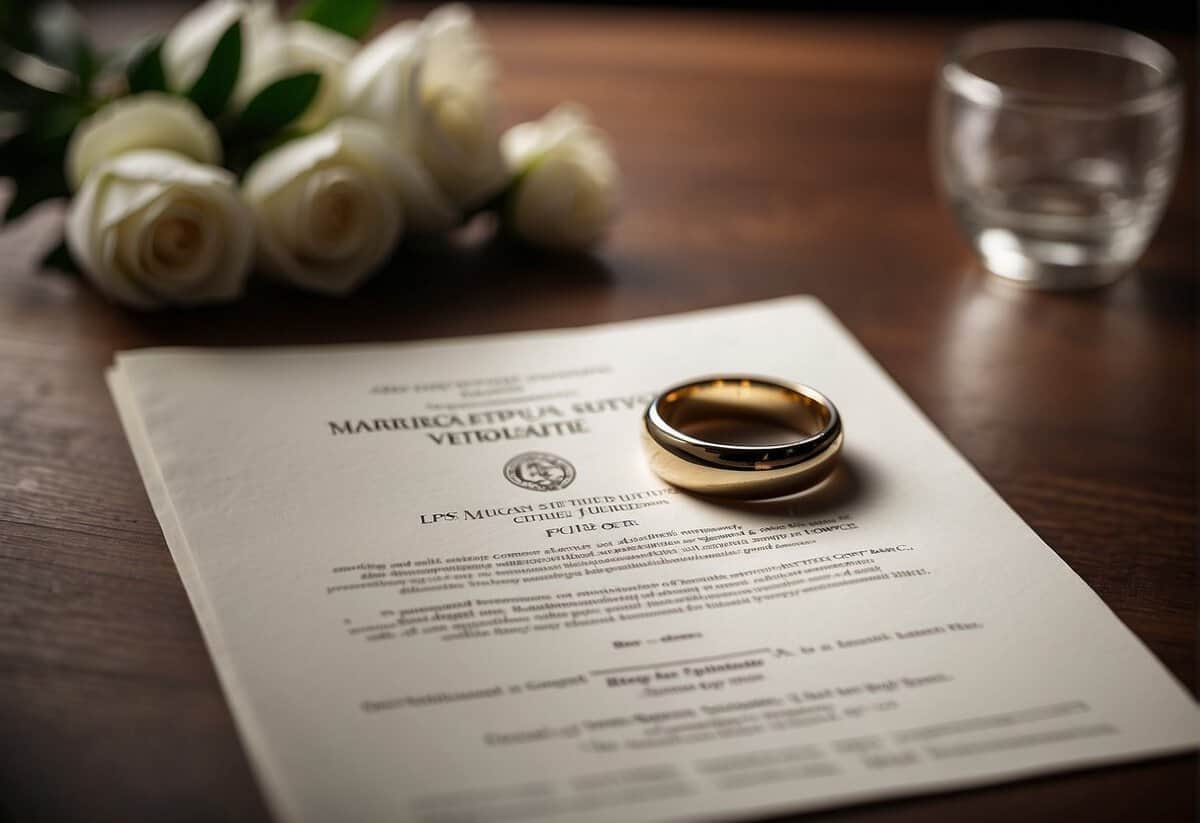Can I Get Married Without Divorce Papers in the UK? Understanding Legal Requirements
Navigating the complexities of marriage after a divorce in the UK requires a clear understanding of the law. As per the legal system in England and Wales, you cannot remarry without finalising your divorce. The divorce process modifies your marital status, providing you with the necessary documentation to enter into a new marriage. Essentially, this means that if you are still legally married, you must complete the divorce proceedings and obtain the Decree Absolute or final order before you have the legal freedom to marry again.

If you’re contemplating a new marriage but haven’t started the divorce process, it’s important to consider that getting a divorce can be a straightforward endeavour provided that both parties agree. New legislation introduced in April 2022 allows for a ‘no-fault’ divorce, which eliminates the need to assign blame and can simplify the process. While this doesn’t negate the need for a legal termination of your previous marriage, it does mean that the process could potentially be less contentious.
Key Takeaways
- You must finalise your divorce before legally remarrying in the UK.
- The ‘no-fault’ divorce law introduced in April 2022 simplifies the process of divorce.
- Legal separation is a potential alternative if you do not wish to terminate your existing marriage.
Legal Prerequisites for Marriage in the UK

When you’re planning to get married in the UK, it’s crucial that you’re aware of and follow the legal requirements. This includes everything from obtaining a decree absolute if you’re divorced to understanding which marriages may be considered void.
Understanding Marriage Laws
In the UK, you must be at least 16 years old to get married or enter into a civil partnership. However, if you’re in England or Wales and under 18, you will need parental consent. It’s important to remember that same-sex marriage and civil partnerships are also recognized. For a marriage to be legally recognized, you must provide a valid marriage certificate upon completion of the ceremony.
Necessity of a Decree Absolute
If you’ve previously been married, you need to have a decree absolute to show that your marriage has legally ended. Without this document, your new marriage would not be valid. If you’re in any doubt about the status of your previous marriage or how to obtain a decree absolute, seeking legal advice is a smart move.
Prohibitions and Void Marriages
There are strict prohibitions that can make a marriage void from the start, for example, if the parties are closely related. Moreover, bigamy, or getting married to someone while still legally married to another person, makes the marriage void. When planning your wedding, you should be certain that none of these prohibitions apply to you. If you’re unsure about any potential legal barriers to your marriage, it’s essential to consult a professional within the jurisdiction of the UK where the marriage is to be registered.
The Divorce Process and Re-Marriage

When considering remarriage in the UK, it’s essential to understand that you must have a legally finalized divorce, evidenced by a decree absolute. Without this, any subsequent marriage would not be legally valid. Navigating this process involves several steps, from initiating divorce proceedings to arranging finances and childcare.
Initiating Divorce Proceedings
To start the divorce process in the UK, you must file a divorce petition. This document is a formal request to the court for a dissolution of marriage. You will need to supply the acknowledgement of service form along with your petition, which confirms that your spouse has been notified of the proceedings. If you’re initiating the divorce, you’ll be referred to as the petitioner and your spouse as the respondent. Remember that one of the grounds for divorce is that the marriage has broken down irretrievably.
Financial and Child Arrangements
Once divorce proceedings are underway, you’ll need to reach agreements on children and financials. Child arrangements may include custody and child maintenance, ensuring that any children involved maintain a stable environment. A financial order can cover various assets such as savings, investments, and property. The aim is to reach a settlement that is fair to both parties. If you’re unable to reach an agreement, the court might intervene to divide assets and decide on child arrangements.
Finalizing Divorce and Certifications
A decree nisi is a provisional decree of divorce. However, to remarry, you need the decree absolute, which is the final legal document ending your marriage. It’s important to get a certified copy of your decree absolute; without this, you cannot legally enter into a new marriage. If your decree or other vital documents are not in English, you may also require a certified translation. Once you have your final divorce decree, you are free to plan your remarriage, knowing that your previous marital commitments have been formally concluded.
Remember, adhering to these steps ensures that your path to a new beginning is set on a firm legal foundation.
Alternatives to Divorce

When considering ending a marriage, know that divorce is not your only option. In the UK, alternatives like legal separation, annulment, and the dissolution of civil partnerships offer ways to formalize the end of a relationship without divorce.
Legal Separation and Annulment
Legal Separation: Also known as judicial separation, this option allows you to live apart from your spouse without ending the marriage. You can make formal decisions regarding finances and children, but remain legally married. This can serve as a space for reflection or a step before deciding on an annulment or divorce.
- Key Aspects:
- You stay legally married but live separately.
- Ability to make formal arrangements regarding finances and children.
Annulment: An annulment declares your marriage null and void, as if it never existed, under certain circumstances like non-consummation, one partner being already married, or the marriage being entered into without consent. Unlike divorce, annulments can be applied for any time after the wedding. There are specific legal reasons that must be met for an annulment.
- Key Aspects:
- Declares the marriage never legally existed.
- No time limit to apply, but specific legal grounds are required.
Dissolution of Civil Partnerships
Dissolution: If you’re in a civil partnership, dissolution is the equivalent of divorce for married couples. Introduced by the Dissolution and Separation Act 2020, the process is similar to divorce and can be initiated after you have been in a partnership for at least one year.
- Key Aspects:
- Only applicable to civil partnerships, not marriages.
- Similar process to divorce but tailored for civil partnerships.
The “no fault” option introduced by the 2020 Act offers a more amicable route to dissolution, eliminating the need to assign blame for the relationship ending. It is a progressive step towards more straightforward and less acrimonious separations.
Seeking Legal Support

When navigating the waters of UK divorce law, you need someone who can guide you expertly through the process. Choosing a qualified divorce solicitor and understanding the associated costs and possible mediation are critical steps for you to ensure your interests are well represented.
Choosing the Right Divorce Solicitor
Your choice in a divorce solicitor is paramount. You need a legal advisor who not only understands your specific circumstances but also has a track record of guiding their clients through the intricacies of divorce law. To find the right solicitor, consider these steps:
- Research: Look into their background, experience, and client reviews.
- Specialisation: Ensure they specialise in divorce or family law.
- Accreditation: Check for accreditation with the Law Society.
- Initial Consultation: Take advantage of free consultations to gauge compatibility.
Understanding Costs and Mediation
Divorce proceedings can have significant financial implications, so it’s critical to understand the expenses involved. Here’s what you should consider:
- Legal Fees: Enquire about the solicitor’s fees and payment structures (e.g., flat fees, hourly rates).
- Mediation: Before the courts are involved, you may explore mediation as a cost-effective alternative to settle disputes regarding money or children. Mediation often leads to a quicker and less expensive resolution.
- Financial Settlement: Be prepared to discuss the division of assets and financial settlement.
Remember, it is possible to find financial advice on divorce or dissolution and how this aligns with your money and assets. Negotiating a financial settlement can be complex, so take the time to understand your legal rights and options.
Frequently Asked Questions

In this section, you’ll find detailed answers to some of the most common questions about marrying in the United Kingdom. These address the legal requirements, documentation, special circumstances, and costs related to civil marriage ceremonies.
What steps are required to legally marry in the United Kingdom?
To legally marry in the UK, you must first give notice of your intention to marry at your local register office at least 29 days before your ceremony. You and your partner must have lived in England or Wales for at least seven days before giving notice. Additionally, you’ll need to provide proof of identity, nationality, and residence.
Are previous divorce documents necessary to remarry in the United Kingdom?
Yes, if you’ve been previously married, you must provide the original final divorce decree or a certified copy to prove that you are legally free to remarry.
What is the process for a foreign national to marry a UK resident?
A foreign national wishing to marry a UK resident must obtain a Marriage Visitor visa if they do not intend to stay or settle in the UK after the marriage. They must also give notice of the marriage at a designated register office.
How can I expedite my marriage in the United Kingdom?
Under standard circumstances, there’s a 29-day waiting period after giving notice. In exceptional cases, such as when a partner is critically ill, you can apply to a Superintendent Registrar for a reduction of this notice period.
What are the costs associated with a civil marriage ceremony at a UK registry office?
The costs for a civil marriage ceremony in a UK registry office include the notice of marriage fee (£35 per person) and the ceremony fees, which can vary by location and the type of ceremony you choose.
Is an online marriage ceremony recognised in the UK, and how can it be done?
Online marriage ceremonies are not legally recognized in the UK. All marriages must be conducted in person, in the presence of a person or persons authorized to register marriages in the building, and two witnesses.



